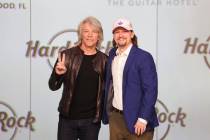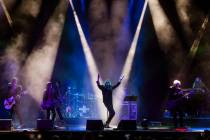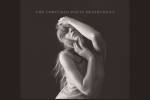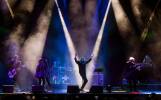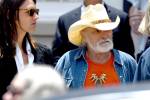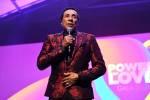Hoodie Allen makes sure it’s easy to find him online
Hoodie Allen left a steady job at Google to become a rapper.
"I wouldn't have done it unless it's what I innately felt I was meant to do and what makes me truly happy," the 27-year-old Allen says. "I was determined to succeed in it because that was the only thing I really wanted. It was definitely a risk at the time and it paid off. It just sort of subscribes to the idea that, you know, if you want to do something definitely put your full investment, 100 percent, into it in order to give yourself a chance to succeed. When I made that decision, it was definitely like, 'Hey, you're giving up something stable for something uncertain.' So, you know, you've really got to commit yourself for it."
Allen says he didn't glean any insight during his time as an AdWords associate with Google that he's been able to use to propel his career forward. "I didn't pick up any secrets or anything like that in terms of marketing," he notes. "Mostly all of my marketing has been really grassroots and word of mouth, nothing paid."
Just the same, Allen clearly has a firm handle on optimization. From serving up songs on YouTube, Soundcloud and DatPiff, the rapper, who manages himself and issues his own music independently, has made his material available on multiple platforms since the beginning with an eye toward making it as easy as possible for fans to find him.
"With this whole process, I really subscribe to the mentality that I don't know where you — the fan, or the potential fan who doesn't exist yet — is going to hear about me, but I'm going to make it as easy to find via their normal method," Allen says. "So if what they usually do is go to YouTube and search it, I want to be the first thing that comes up. If they usually go to Soundcloud, and they look at the Soundcloud page, I want it to be right there. If they go to the website, I want you to be able to click it with one download and get it. With Spotify, same thing. iTunes, same thing. My mentality is make it easy for the people, and the people will come."
And when the fans find you, you'd better give them something to remember.
"I always tell people, especially up-and-coming people, don't tour before the music is there," he says. "A lot of kids nowadays are so interested in getting on the road and opening for a tour, even paying to have an opening spot on a show. To me, none of it is worthwhile, unless those fans go home and they want to check out your music, that the music is going to stand up tenfold to the show that they saw and make them become fans. Otherwise, you're just a guy who put on an energetic show. I always think it's music first. And from the music, you can build everything else out, if you really focus in on the fans and give them the opportunity to see you."
To reach that place, Allen says, he's had to learn how to follow his own muse rather than overanalyzing everything, something that's challenging for an artist who's tasked with overseeing his own career. "The biggest thing I've learned is that you really should believe in what you're doing for yourself and be secure in yourself as an artist and trust your instincts," he says. "I've seen too many of my peers sort of change who they are, or let themselves be influenced to try to play to radio gain — or what their version of a hit is — or how they're going to compel their label to take interest in them and put out their record. I think it's all kind of unfortunate because they distract themselves from what made them so appealing to people to begin with.
Allen's perception, at least in part, has been shaped by his own experience.
"Sometimes I tend to overthink the process in making a new album, a new project for people, and I can tend to let it stretch on," Allen says, noting how different putting together "Happy Camper," his latest album, was from his past projects. "On this one, I really wanted to make a project that was for me, first and foremost. I wanted to be able, in two years time, to play this and still be excited about listening to the songs for myself — which I can't always say about every song on every album I've put out. I stopped thinking about, 'Hey, does this song fit this quotient, or this genre, or this sound,' and I just made a bunch of music that I thought I would like, and if I liked it, I was hoping that, by extension, the fans that I have would also like it.
"As an artist," he adds, "I want to give something that people can take with them and live and let it be the soundtrack to a point in their life." Essentially, Allen is striving to make music that has the same sort of impact as the acts that shaped his sensibilities. The New York-bred rapper, born Steven Markowitz, spent his teens as an underground hip-hop fan who gravitated toward thought-provoking MCs like Mos Def, Talib Kweli, Little Brother, Outkast, De La Soul, Atmosphere and Murs.
"What appealed to me so much about them growing up," Allen says, "I just loved the way these guys were able to paint a picture and tell a story with words. I found it so captivating, just the rhythmic nature. It was just so vivid, in terms of storytelling, and I really try to do my own version of that where I can. I think in terms of songwriting and storytelling, I look to those guys as a huge inspiration."
For his part, as a lyricist, Allen has peppered his past releases with pop-culture references, on songs such as "All About It," for instance, in which he likens himself to "Larry David plus Miles Davis." On this record, however, he says, "I really wanted to be more honest and real than I've ever been and just not talk about a relationship or a girl — although there's a lot of songs that do have to deal with that topic. I wanted to explore more ideas. The idea of 'Happy Camper' is sort of about the face that we put out to the world of how great everything is and how happy we are. Sort of a veiled look at our own reality because we hide everything else from things like social media and from our friends."
Indeed, Allen wastes little time exposing his own vulnerability on the album's opening track, "Intro to Anxiety."
"I think I'll be alone forever, maybe I'll live with my parents / That way I could eat the food and never feel embarrassed," he muses, after rapping telling lines like, "Life can be super happy, life can be super sad / I'm trying super hard to separate the good and the bad / I'll go back to my future just to get to my past / But knowing me, my DeLorean would probably crash / Sometimes I get in a taxi when I ain't got no cash / Worry if my credit card don't work, then I might have to dash / Have the cabdriver chase me 20 blocks down 7th Ave / And if he catching up to me, I know he'll wanna kick my ass."
That sort of neurosis seems entirely fitting for an artist whose moniker nods to a certain diminutive, neurotic, bespectacled actor and filmmaker. Curious who that person might be? Drawing a blank? Think about it for a sec ...
Better yet, just Google his name and see what comes up.
— Read more from Dave Herrera at reviewjournal.com. Contact him at dherrera@reviewjournal.com or follow @rjmusicdh on Twitter.
Like Neon Las Vegas on Facebook:


















